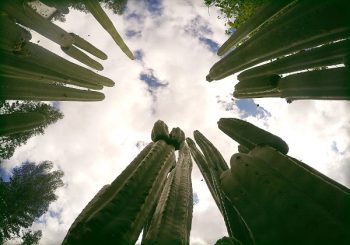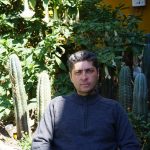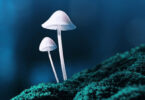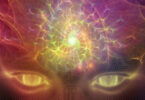Contributing writer for Wake Up World
Many times I have been asked what is the most important thing I’ve learned from working with Huachuma medicine over the years. Not once I could answer it simply, although I always did it truthfully.
This is not because I didn’t have something to say. In fact, I had a lot to say, perhaps even too much, which created an obstacle for a simple answer. If you ask me this question today, I don’t think much has changed. I would still not know where to start and where to end. But regardless of how truthful my words are, they are not capable of reflecting the experience. They can only point the way.
We all have heard about the Tree of Life and Tree of Knowledge, two magical trees that supposedly grew in the Garden of Eden, the latter of which being responsible for the Fall of humanity after Eve ate an apple from it. Bypassing the moral side of the story, which can be debated, I would like to make the following point. It has been imprinted in our Western minds that anything magical or miraculous is either a myth found in a children’s story or written in the Bible. What if I told you that magic is found right here and now on Earth? Not the magic you see on the stage performed by David Copperfield, who is perhaps the greatest illusionist of our time, but the magic that is capable of actually transforming your life. Watching Copperfield fly off the stage is entertaining but does not change anything in your life.
For me, magic has a different meaning. It’s the magic of healing, the alchemical process during which your ego melts and, out of this psychic lava, your true self appears. It can thaw the parts of your soul that were frozen by trauma and give you your life back, a life of joy, clarity, confidence and strength. It has the power to recalibrate your brain chemistry and permanently fix the imbalances, thus healing depression. It has the power to reset you and give you a fresh start in life. This is what I call magic.
This is what, with proper guidance, sacred plants can do. They can free your mind so you can fly above ideologies and belief systems. That’s the kind of flight you would want to book a seat on.
When I was a kid hearing about the Tree of Life and the Tree of Knowledge, I was fascinated. I thought that those kinds of trees must be found somewhere on Earth, otherwise it would be torture to our hearts and minds to hear about them without the possibility of ever reaching them. Decades later, I was led to sacred plants in South and North America, and thus a journey of self-discovery has taken on a new meaning.
Today, I have many Huachuma cacti growing in my garden. Sustaining my soul by harvesting from my garden keeps me clear and straight on my path. No need for Heaven, no fear of the Devil. All is good and everyone is happy. Huachuma, among a few other sacred plants such as Peyote and Ayahuasca, are here to serve humanity, to guide it through the darkness that we have imposed on ourselves. It’s a medicine that enlightens us so we can see our path with clarity and understanding. I touch upon this subject in my book The Mescaline Confession: Breaking through the Walls of Delusion, an important read for people who are ready to see deeper into the Matrix of society.
Everyone finds his or her own truth and bases their lives upon it. This may or may not resonate with the greatest minds known to human history. This, however, should not set you back on your path of self-discovery. Each of us has our own path to walk, our own lessons to learn and our own wisdom to find. Yet we enhance our human experience when we all share the understanding that truth can only be realized for oneself and words are not the things for which they stand. Many ancient teachings support this claim.
“What is the ultimate teaching of Buddhism? You won’t understand it until you have it,” says Shitou Xiqian, an 8th-century Zen Buddhist teacher.
The Diamond Sutra states, “What is known of the teaching of Buddha is not the teaching of Buddha.”
The Lankavatara Sutra says, “With the lamp of the word and discrimination one must go beyond the word and discrimination and enter upon the path of realization.”
Each of these statements points to the necessity of having an immediate spiritual experience to define the truth.
And one more, from Rumi: “Can I explain the Friend to one for whom he is not a Friend?” Of course not! You just can’t. You can only inspire his own friendship through which he will know the Friend firsthand.
The point here is that the copy of someone’s truth is not your truth unless you realize it yourself and thus it becomes you. From this perspective, guidance is important but following it blindly does not serve you well. Words are only the symbols on the map of consciousness. They are the road signs that point the direction that a seeker of truth must take.
The problem with any religious and spiritual teaching is that the teachers had to use language to convey the teaching. Language is a tool used in time to try to describe a timeless experience – what I would call a Divine presence. The history of all religion is similar in one important respect. In every religion there were enlightened people who not only spoke the truth but were the truth themselves. However, these individuals were a few among the many. The majority were students of words about the truth, not students of the truth itself. Although the words are indispensable to point the way, at the same time they can become a mind trap that holds us captive. Thus dogma is born.
We learn by firsthand experience, not by other people’s description of it. To become a painter, you have to paint; to become a musician you have to play an instrument; to become a chef you have to cook; to become a driver you have to drive. How can this be different in learning about the spiritual nature of reality? This crucial point must be cemented in one’s understanding.
But this is not to say that the saints and spiritual teachers of humanity wasted their time. Not at all. Without them, we wouldn’t even have a sense of direction beyond our instinctive mode of living. Many of us are still living that way regardless. The greatest and brightest among us have paved the way forward. However, if we become obsessed with words and take them literally, we are running the risk of losing ourselves in the labyrinths of the mind.
Nor we should ignore words all together, which would lead to another extreme. I find the middle way to be the most productive. “Learning but discerning” is my personal motto. It has proven to work in my own experience. Whatever I read, I test with my own ability to perceive and understand. If theology would teach discernment I would considering taking a class. But what is theology if not a mystical insight that has been rationalized in terms of general knowledge? The founders of any religion were mystics first, then theologians. It follows that the mystical experience, firsthand spiritual knowledge, is what we should be seeking.
I touch on this subject in my first book, PATH: Seeking Truth in a World of Lies. Religion is a natural science that should be guided by experience, just as physical science is guided by research. This leads me back to the method of discernment I talked about earlier: a plant-based shamanic experience that can enlighten you to the point of clarity, in which you are able to separate the wheat from the chaff. The shamanic landscape is vast and not all of its aspects lead to this end. However, I found mescaline-containing cacti like Peyote of Mexico and Huachuma (San Pedro) of Peru to be the ones that do. It is up to you to take the opportunity to discover for yourself that the path of realization is intuitive, not wordy.
Even when we try to describe something simple as grass to another person, we only can say that it is green. However, the experience of seeing green grass is much more than a description. Being so limited in our communicative abilities when it comes to even describing a visible object, how much more limited are we when we try to describe a personal, spiritual experience? When I think about it, I can feel the pain of all those Sufis, saints and real teachers who felt like victims of their own words. And yet, they tried their very best to convey to us the glory of Divine existence.
To me, salvation means to touch the heart of existence and know it by experience. To seek salvation in words is like trying to cross an ocean by looking at the map. Today any map is available, yet still, it takes the action to reach a destination.
Please enjoy our new podcast in which we discuss psychedelics, medicine, healing, etc. with one of our guests who has just finished a two-week Huachuma retreat with us.
Also, I would like to introduce our new film: Huachuma: The Unforgettable Mystery.
Recommended articles by Sergey Baranov:
- Is Cannibalism the Solution to Food Sustainability in the Future?
- Climate Solutions are Obvious – But Profit and Politics Stand in the Way
- A Shamanic Bridge to a Better Future
- What is Shamanic Healing?
- Consciousness in Exile: A Shamanic Perspective
- A.I. and the Synthetic Reality – A Shamanic Perspective
- Psychedelic Spirituality
- Government Is Not Your Friend – It’s Your Employee
- Why Consciousness Expanding Plants Are Feared And Deemed Illegal
- Mescaline: An Ancient Medicine for the Soul
About the author:
Sergey Baranov is the founder of Huachuma Wasi, a healing center in The Sacred Valley of the Incas, Peru. He is the author of Path: Seeking Truth In a World of Lies, The Mescaline Confession: Breaking Through the Walls of Delusion and Write Your Zen in 30 Days. Sergey’s passion for life on Earth and its preservation is the driving force behind his work.
You can contact Sergey at www.huachumawasi.com

If you've ever found value in our articles, we'd greatly appreciate your support by purchasing Mindful Meditation Techniques for Kids - A Practical Guide for Adults to Empower Kids with the Gift of Inner Peace and Resilience for Life.
In the spirit of mindfulness, we encourage you to choose the paperback version. Delve into its pages away from screen glare and notifications, allowing yourself to fully immerse in the transformative practices within. The physical book enriches the learning process and serves as a tangible commitment to mindfulness, easily shared among family and friends.
Over the past few years, Wake Up World has faced significant online censorship, impacting our financial ability to stay online. Instead of soliciting donations, we're exploring win-win solutions with our readers to remain financially viable. Moving into book publishing, we hope to secure ongoing funds to continue our mission. With over 8,500 articles published in the past 13 years, we are committed to keeping our content free and accessible to everyone, without resorting to a paywall.




